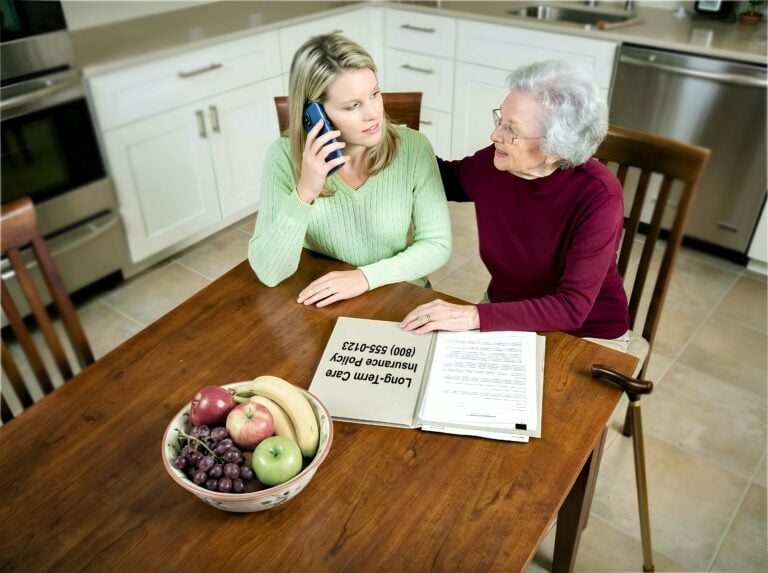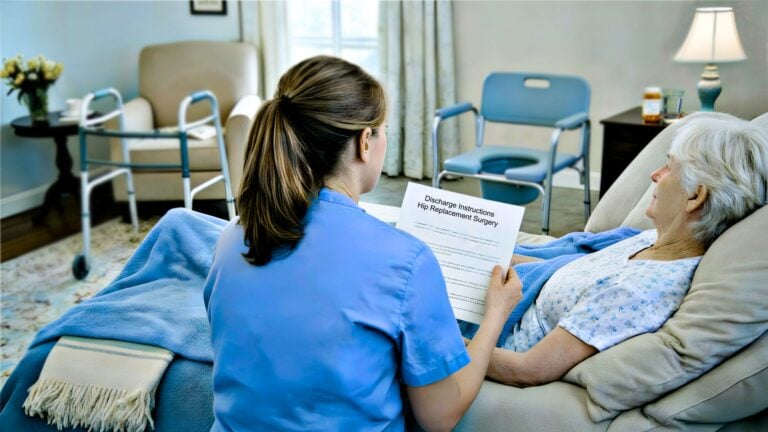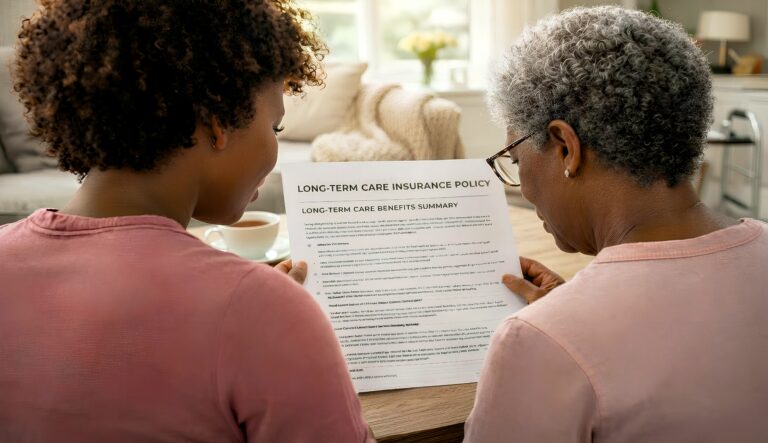It’s 2 a.m. Your mom is awake again, staring at the ceiling. She’s exhausted but can’t sleep. This has been happening for months.
If this sounds familiar, you’re not alone. Sleep problems affect 30% to 70% of adults over 65, making insomnia one of the most common yet undertreated health issues in older adults. A landmark 2024 global study of nearly one million seniors across 36 countries confirmed what families have long suspected: poor sleep in older adults isn’t just frustrating. It’s dangerous.
Chronic insomnia increases the risk of falls, cognitive decline, depression, heart disease, and premature death. Recent research shows that men and women who consistently achieve quality sleep add an extra 4.7 and 2.4 years to their lives, respectively.
But here’s the good news: insomnia in seniors is treatable. Understanding why it happens—and what actually works to fix it—can restore both sleep and quality of life.
Why Sleep Changes as We Age
Sleep isn’t just about closing your eyes for 8 hours. It’s a complex biological process that changes dramatically as we age.
How Much Sleep Do Seniors Actually Need?
Despite popular myths, older adults need just as much sleep as younger adults: 7 to 9 hours per night.
The difference isn’t in the amount of sleep needed—it’s in the ability to get it. The American Heart Association now includes sleep as one of “Life’s Essential 8″—the core health behaviors that protect cardiovascular and brain health, alongside diet, exercise, and blood pressure control.
The 5 Stages of Sleep
Every night, your brain cycles through five stages of sleep, repeating the cycle 4 to 5 times:
NREM Stage 1: Light sleep—you’re drifting off but easily awakened
NREM Stage 2: Light sleep deepens—heart rate slows, body temperature drops
NREM Stage 3: Deep sleep begins—the body repairs tissues, builds bone and muscle
NREM Stage 4: Deepest sleep—this is when your body does its most important restoration work
REM Sleep: Rapid Eye Movement—dreams occur, the brain consolidates memories and processes emotions
A complete sleep cycle takes about 90 minutes. The most restorative sleep happens in Stages 3 and 4—the deep, dreamless sleep where your body repairs itself.
What Changes with Age
As we age, several changes make quality sleep harder to achieve:
→ Less time in deep sleep — Instead of cycling through all five stages, seniors often spend more time in light sleep (Stages 1 and 2) and less time in deep, restorative sleep (Stages 3 and 4).
→ Fragmented sleep — Seniors wake up more frequently during the night and have trouble falling back asleep. Sleep maintenance problems affect over 20% of adults 65 and older.
→ Circadian rhythm shifts — Many older adults feel sleepy earlier in the evening and wake up earlier in the morning—sometimes as early as 3 or 4 a.m.
→ Decreased sleep efficiency — Younger adults might spend 95% of their time in bed actually sleeping. For seniors, that number often drops to 75% or lower.
The result? Your loved one may be in bed for 8 hours but sleeping only 5 to 6 hours, most of which is light, unrefreshing sleep.
How Common Are Sleep Problems in Seniors?
The 2024 global meta-analysis published in Sleep Medicine Reviews analyzed 252 studies involving 995,544 older adults from 36 countries. The findings reveal just how widespread sleep problems are:
| Sleep Problem | Prevalence in Older Adults |
|---|---|
| Obstructive sleep apnea | 46% |
| Poor sleep quality | 40% |
| Insomnia symptoms | 29-50% |
| Excessive daytime sleepiness | 19% |
| Chronic insomnia disorder | 12-20% |
Perhaps most concerning: approximately 50% of seniors with sleep problems go undiagnosed. Many older adults assume poor sleep is just a normal part of aging—but it isn’t, and it doesn’t have to be accepted.
What Causes Insomnia in Seniors
Insomnia isn’t a normal part of aging. It’s usually caused by specific, identifiable factors—many of which are treatable.
1. Medications
This is the most overlooked cause of senior insomnia.
Many common medications interfere with sleep:
- Blood pressure medications (especially beta-blockers)
- Antidepressants (SSRIs can disrupt REM sleep)
- Corticosteroids (prednisone causes wakefulness)
- Diuretics (frequent nighttime urination)
- Decongestants and cold medications (contain stimulants)
- Pain medications (some contain caffeine)
✓ What to do — Schedule a medication review with your loved one’s doctor. Ask specifically: “Could any of these medications be interfering with sleep?” Sometimes adjusting the timing of dosage (taking diuretics in the morning instead of the evening) can make a significant difference.
2. Underlying Health Conditions
Chronic health problems commonly cause sleep disruption:
Sleep apnea — Breathing stops repeatedly during sleep, causing frequent awakenings (often unnoticed by the sleeper). This is the most common sleep disorder in seniors, affecting 46% of community-dwelling older adults.
Restless leg syndrome — Uncontrollable urge to move legs makes falling asleep difficult
Chronic pain — Arthritis, neuropathy, or back pain makes comfortable sleep impossible
Heart disease — Shortness of breath or chest discomfort worsens when lying flat
Acid reflux (GERD) — Stomach acid rises when lying down, causing burning and coughing
Prostate issues — Frequent nighttime urination disrupts sleep cycles
Dementia and Alzheimer’s — Disrupts circadian rhythms and causes “sundowning” (agitation in the evening)
✓ What to do — Treating the underlying condition often resolves the sleep problem. If your loved one has untreated pain, difficulty breathing at night, or frequent bathroom trips, addressing these issues should be the first step.
3. Anxiety, Depression, and Stress
Older adults carry unique sources of worry:
- Fear about declining health or mortality
- Financial stress (fixed income, rising costs)
- Grief from losing spouses, friends, or independence
- Loneliness and social isolation
- Worry about being a burden to family
These thoughts intensify at night when there are no distractions. A mind racing with worry can’t relax into sleep. Research shows a strong bidirectional relationship between insomnia and depression—each condition worsens the other.
✓ What to do — If your loved one seems anxious, withdrawn, or mentions feeling hopeless, talk to their doctor about depression or anxiety treatment. Therapy, support groups, and sometimes medication can help.
4. Physical Inactivity
As people age, they often become less active. This creates a vicious cycle:
→ Less activity → less physical tiredness → difficulty falling asleep
→ Poor sleep → less energy → even less activity the next day
✓ What to do — Encourage gentle daily movement. Even a 20-minute walk can significantly improve sleep quality.
5. Poor Sleep Habits
Many seniors develop habits that sabotage sleep:
- Napping for hours during the day
- Irregular sleep schedules (sleeping whenever they feel tired)
- Using the bedroom for activities other than sleep (watching TV in bed)
- Drinking coffee or tea late in the day
- Eating heavy meals close to bedtime
✓ What to do — Establish consistent routines. Small changes add up.
The Dangers of Untreated Insomnia
Poor sleep isn’t just annoying. In seniors, chronic insomnia has serious health consequences:
▶ Cognitive decline — Sleep is when the brain clears out toxins linked to Alzheimer’s disease. Poor sleep accelerates cognitive decline.
▶ Increased fall risk — Exhaustion impairs balance, reaction time, and judgment.
▶ Weakened immune system — Sleep is when the body repairs and strengthens defenses.
▶ Depression — Chronic sleep deprivation dramatically increases depression risk.
▶ Heart disease and stroke — Poor sleep raises blood pressure and inflammation, increasing heart attack and stroke risk.
▶ Higher mortality — A 2024 study of over 36,000 veterans found that seniors with insomnia had significantly higher death rates: 34.8 deaths per 1,000 person-years compared to 27.8 in those without insomnia.
What Actually Helps: Evidence-Based Solutions
Forget counting sheep. Here’s what research shows actually works:
1. Create a Sleep-Optimized Environment
Your loved one’s bedroom should be a sleep sanctuary—nothing else.
✓ Temperature — Keep it cool, 60-67°F is ideal. Older adults often keep their homes too warm, which disrupts sleep.
✓ Darkness — Use blackout curtains or a sleep mask. Even small amounts of light interfere with melatonin production.
✓ Quiet — Block noise with earplugs, a white noise machine, or a fan.
✓ Comfort — Invest in a quality mattress and pillows. If arthritis or pain is an issue, consider a memory foam mattress topper.
✓ Remove distractions — No TV, computer, or phone in the bedroom. The bed is for sleep only.
✓ Consider aromatherapy — Lavender has proven sleep-inducing properties. A few drops of lavender essential oil on a pillowcase can help.
2. Establish a Consistent Sleep Schedule
This is the most critical habit change.
✓ Go to bed at the same time every night—even weekends
✓ Wake up at the same time every morning—even if sleep was poor
✓ No napping after 3 p.m.
✓ If napping is necessary, limit to 20-30 minutes
A consistent schedule retrains the body’s circadian rhythm and is one of the most effective interventions for chronic insomnia.
3. Develop a Wind-Down Routine
The body needs time to transition from wakefulness to sleep. Create a calming 30 to 60-minute routine before bed:
- Dim the lights (bright light signals the brain to stay awake)
- Take a warm bath (the post-bath temperature drop signals sleep time)
- Practice gentle stretching or yoga
- Listen to calming music or nature sounds
- Read a physical book (not on a screen)
- Practice deep breathing or meditation
What to avoid: Anything stimulating—news, upsetting conversations, intense exercise, or blue light from screens.
4. Get Sunlight and Exercise During the Day
Morning sunlight exposure is critical. It resets the circadian clock and improves nighttime sleep.
✓ Spend at least 20-30 minutes outside in the morning
✓ Exercise earlier in the day (not within 3 hours of bedtime)
✓ Even light activity helps—gardening, walking, gentle chair exercises
Physical activity creates healthy tiredness. Sunlight regulates melatonin production.
5. Watch What and When They Eat and Drink
Caffeine: No coffee, tea, soda, or chocolate after 2 p.m. Caffeine stays in the system for 6+ hours.
Alcohol: While it may help people fall asleep initially, alcohol disrupts deep sleep and causes early-morning waking. Avoid within 3 hours of bedtime.
Large meals: Eat dinner at least 3 hours before bed. Heavy, spicy, or acidic foods can cause reflux.
Fluids: Limit liquids after 6 p.m. to reduce nighttime bathroom trips.
Sleep-promoting foods: Tart cherry juice, kiwi, almonds, and chamomile tea have natural sleep benefits.
6. Use the “15-Minute Rule”
If your loved one has been lying in bed awake for more than 15 minutes (whether falling asleep or after waking during the night):
- Get out of bed
- Go to another room
- Do something boring and quiet (fold laundry, read something dull)
- Return to bed only when sleepy
Staying awake in bed trains the brain to associate the bed with wakefulness rather than sleep. This technique, called stimulus control, is a core component of the most effective treatment for insomnia.
7. Cognitive Behavioral Therapy for Insomnia (CBT-I)
This is the gold standard treatment for chronic insomnia—and it works better than sleeping pills without side effects. The American Academy of Sleep Medicine gives CBT-I a “strong” recommendation, the highest rating for any behavioral treatment.
CBT-I is a structured program that helps seniors:
- Identify and change thoughts and behaviors that interfere with sleep
- Replace worry and racing thoughts with relaxation techniques
- Build healthy sleep habits that stick
New in 2025: Digital CBT-I programs are now clinically validated for older adults. A July 2025 randomized controlled trial of 311 participants ages 55-95 found that internet-based CBT-I produced significant improvements in insomnia severity, sleep quality, and daytime functioning—with benefits lasting through 12-month follow-up. This makes effective treatment accessible even for those who can’t travel to see a sleep specialist.
✓ How to access it — Ask your doctor for a referral to a sleep psychologist, or look for FDA-cleared digital CBT-I programs like Somryst designed specifically for seniors.
8. When to Consider Medication
Sleeping pills should be a last resort, not a first response.
Why? Because in seniors, sleep medications cause:
- Increased fall risk
- Confusion and memory problems
- Dependency
- Rebound insomnia when stopped
The 2023 American Geriatrics Society Beers Criteria specifically recommends avoiding benzodiazepines and Z-drugs (like zolpidem/Ambien) in older adults due to increased risk of cognitive impairment, delirium, falls, fractures, and motor vehicle accidents.
However, short-term use may be appropriate during acute stress (grief, illness, relocation) or while working on behavioral changes.
Safer options include:
- Melatonin (0.5-3 mg, taken 2 hours before bed)
- Magnesium supplements
- Prescription medications specifically approved for seniors (if other methods fail)
▶ Important — Always consult a doctor before starting any sleep supplement or medication.
How In-Home Caregivers Can Help
Here’s something families often don’t consider: in-home caregivers can dramatically improve a senior’s sleep.
How?
✓ Establishing routines — Caregivers create consistent daily schedules with meals, activities, and bedtime at the same time each day.
✓ Encouraging daytime activity — Caregivers take seniors for walks, engage them in light exercise, and prevent excessive daytime napping.
✓ Preparing sleep-friendly environments — Caregivers ensure the bedroom is dark, quiet, and comfortable before bed.
✓ Managing medications properly — Caregivers help seniors take medicines at the correct times to minimize sleep disruption.
✓ Reducing evening anxiety — Knowing someone will be there in the morning reduces nighttime worry about falls or emergencies.
✓ Providing companionship — Social interaction during the day reduces loneliness and depression, major contributors to insomnia.
At All Heart Home Care, our caregivers are trained to recognize sleep problems and work with families to implement healthy sleep routines that actually stick.
When to Seek Professional Help
See a doctor if your loved one:
- Has insomnia lasting more than 3 weeks
- Snores loudly or gasps for air during sleep (possible sleep apnea)
- Experiences extreme daytime sleepiness or falls asleep at inappropriate times
- Has hallucinations or acts out dreams (possible REM sleep behavior disorder)
- Shows signs of depression or anxiety
- Has unexplained weight loss, pain, or other concerning symptoms
A sleep study may be necessary if an underlying sleep disorder, such as sleep apnea or restless legs syndrome, is suspected. Given that sleep apnea affects nearly half of older adults, this evaluation is particularly important.
The Bottom Line
Insomnia in seniors isn’t inevitable. It’s a medical problem with real solutions.
Start with the basics:
- Consistent sleep schedule
- Sleep-optimized bedroom
- Daily sunlight and activity
- Wind-down routine before bed
- Medication review with the doctor
Most seniors see improvement within 2 to 4 weeks of consistently implementing these changes.
If your loved one is struggling with sleep—and you’re struggling to help them establish healthy routines—professional in-home care can make a significant difference.
We Can Help
At All Heart Home Care, we help San Diego seniors build the routines, structure, and companionship that lead to better sleep and better health.
If your loved one is experiencing chronic insomnia, exhaustion, or sleep-related safety concerns, we’re here to help.
Call us at (619) 736-4677 for a free in-home consultation. We’ll assess your loved one’s sleep challenges and create a personalized care plan that addresses the root causes—not just the symptoms.
Because good sleep isn’t a luxury. It’s essential to health, safety, and quality of life.
References
- Sleep Medicine Reviews. Worldwide prevalence of sleep problems in community-dwelling older adults: A systematic review and meta-analysis. 2024. sciencedirect.com
- Journal of Sleep Research. Insomnia and risk of mortality in older adults. 2024. pmc.ncbi.nlm.nih.gov
- npj Digital Medicine. A randomized controlled trial of a digital cognitive behavioral therapy for insomnia for older adults. July 2025. nature.com
- American Geriatrics Society. 2023 AGS Beers Criteria for Potentially Inappropriate Medication Use in Older Adults. agsjournals.onlinelibrary.wiley.com
- American Heart Association. Life’s Essential 8. 2024. heart.org
- Sleep Foundation. Insomnia and Older Adults. 2025. sleepfoundation.org
- National Council on Aging. Sleep Statistics for Older Adults. 2026. ncoa.org






